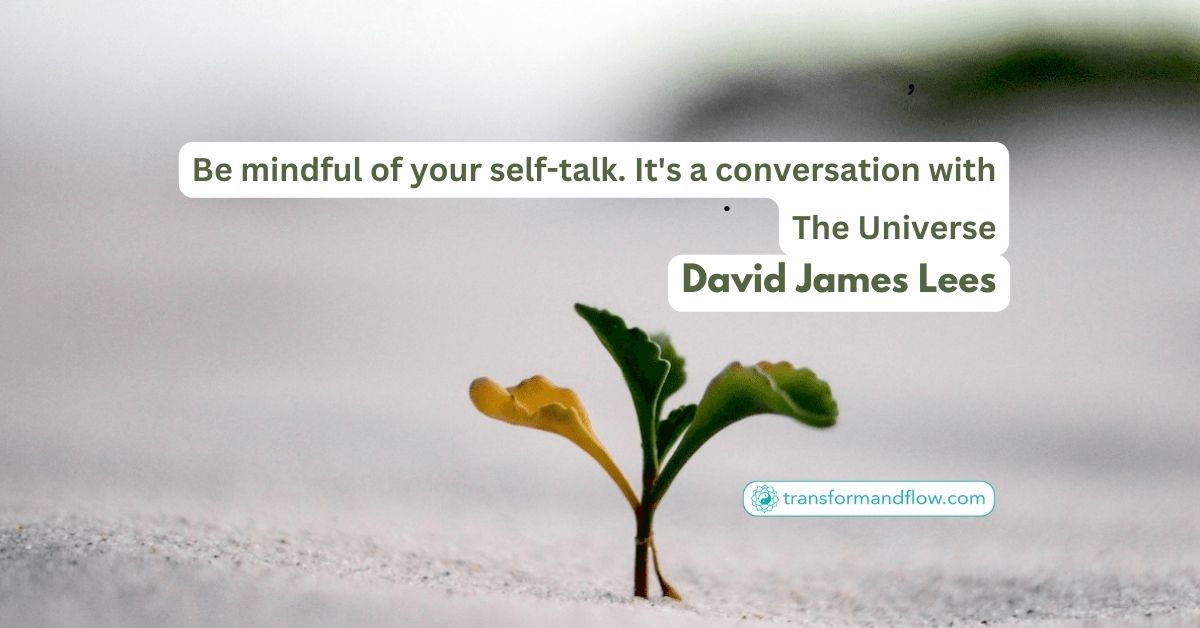“Be mindful of your self-talk. It’s a conversation with the universe.” – David James Lees
This quote holds a profound spiritual truth and a practical life lesson. Every thought, word, and whisper we speak to ourselves not only shapes our internal world but also sends a signal to the external one. It’s easy to underestimate the power of self-talk. It’s quiet, invisible, and private and according to ancient wisdom, modern psychology, and even quantum theories of consciousness, self-talk plays a pivotal role in determining the quality and direction of our lives.
What Is Self-Talk?
Self-talk is the inner dialogue that runs through your mind. The ongoing conversation you have with yourself throughout the day. It can be empowering or defeating, loving or critical, uplifting or destructive. Whether you’re aware of it or not, this narrative becomes the lens through which you experience life.
There are two general categories:
- Positive Self-Talk: Encouraging, supportive thoughts like “I’ve got this,” “I’m doing my best,” or “I am worthy.”
- Negative Self-Talk: Doubtful, fear-based narratives such as “I always mess things up,” “I’m not good enough,” or “This is pointless.”
The impact of these inner statements is immense, and they shape your mood, self-esteem, choices, and even your physical health.
Your Words, Your Reality
Words are creative instruments, not just tools of communication. When you speak words of fear, self-doubt, or defeat, you don’t just feel smaller inside; you begin to attract circumstances that reflect those feelings.
Conversely, words of love, strength, and faith help to align you with higher energy states. They draw in people and opportunities that match your elevated vibration. This is where the concept of “talking to the universe” comes into play.
As you talk to yourself, you’re co-creating your reality.
The Science Behind Self-Talk
Modern science has begun to validate what many spiritual traditions have taught for centuries. Neuroscience shows that repetitive thoughts create neural pathways. The more you reinforce a belief, positive or negative, the stronger that wiring becomes.
Additionally, psychologist Dr. Ethan Kross at the University of Michigan has done extensive work on “distanced self-talk,” demonstrating that when individuals speak to themselves as they would to a friend (using their name or “you”), they gain more clarity, calm, and confidence.
Dig deeper in his TED Talk:
How Self-Talk Aligns with the Universe
In many spiritual and energetic systems, it’s believed that the universe is responsive. The Law of Attraction, the concept of karma, and even quantum theories about observer effects suggest that intention and attention matter.
When your self-talk is rooted in lack, fear, or limitation, you’re energetically affirming those qualities. You’re unknowingly saying, “Yes, this is my reality,” and the universe responds in kind.
But when your inner dialogue is affirming, loving, and bold, you begin to shift that energy. The universe then says, “Okay, let’s work with that.”
This doesn’t mean that changing your self-talk instantly changes your life, but it shifts your trajectory. And over time, that shift becomes visible in your relationships, career, health, and emotional resilience.
Rewriting the Script: Steps to Transform Self-Talk
- Awareness: Start by noticing the tone of your inner dialogue. What do you say when things go wrong? What’s your immediate reaction to failure or discomfort?
- Name the Voice: Give your inner critic a name. This helps create distance between you and the voice that isn’t serving you. On the other hand, naming a positive voice increases its resourcefulness to you when needed.
- Flip the Script: If your self-talk says, “I’m not good enough,” respond with, “I’m learning, and I deserve kindness.” Don’t force fake positivity. It’s ok if it takes time to make it believable and compassionate. That’s part of the journey, and sometimes outside help or more experiences are needed.
- Use Affirmations Wisely: Speak affirmations that feel authentic. Instead of “I’m wildly successful” when you’re broke and stressed, say “I’m building something valuable every day.”
- Speak Aloud: Say positive self-talk out loud. Sound has vibration, and speaking creates more impact than thinking alone. Involve as many emotions and senses as you can. Feel it in the body as you speak it.
- Meditate or Journal: Both practices help you catch unconscious thoughts. Write them down and rewrite them consciously.
Real-Life Examples of Transformative Self-Talk
- Jim Carrey: Before achieving fame, Carrey wrote himself a $10 million check and visualized success daily. His belief in his dreams was so strong that his reality eventually caught up.
Why Jim Carrey Wrote Himself A $10 Million Check Before He Was Famous—Here’s How It Became Reality
- Michael Phelps: The Olympic swimmer used visualization from both sides as part of his training. He imagined a perfect race down to the smallest detail, like everyone does, but he also used negative visualization to prepare himself for the worst possible situations, reinforcing confidence and focus.
The Strange Visualization Technique That Made Michael Phelps Unstoppable
When Self-Talk Meets Spirituality
To be “sitting in conversation with the universe” through self-talk is to enter a sacred co-creative relationship. You begin to realize that your life is not something happening to you, but with you. And the words you choose are seeds you plant.
Whether or not you believe in a divine consciousness, this practice enhances mindfulness, accountability, and empowerment. It teaches you to be intentional about the energy you project and the beliefs you choose to hold.
From a spiritual perspective, your words carry energy. They either elevate your frequency or lower it. When you speak to yourself with kindness, gratitude, and faith, you are not only nurturing your own soul but also attuning yourself to the flow of abundance, love, and clarity. Conversely, when your inner dialogue is filled with fear, doubt, or self-judgment, it can disconnect you from this flow, reinforcing the illusion of separation from the universe or your higher self.
Final Thoughts: Speak Light
Your self-talk is sacred. Every time you speak to yourself with compassion, clarity, and belief, you are planting the seeds of a better life. When you become mindful of the words you use within, you begin to shift what you see around you.
So the next time you catch yourself in a loop of negative self-talk, pause. Breathe. And ask yourself: Would I say this to someone I love? Would my higher self say this to me? Because ultimately, you are not speaking into a void. You are speaking into the universe, and it is always listening.


